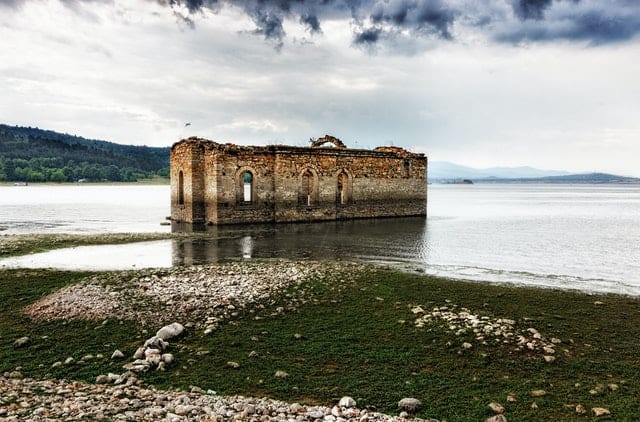archaeology in the landscape
I see this done in two materially different ways, both of which are neat. I’m talking ruins scattered across the landscape, whether it be empty cities, crumbling fortresses, or weathered monuments. The reason I love this so much is because of the vibrancy and sense of history it lends to the environment.
It makes a place feel real, this added layer of complex texture.
It makes it feel old.
The reader has climbed through the wardrobe to witness a snippet of time that is only a tiny portion of a larger reality that is closed to them.
There are two different approaches I’m used to seeing, and I’ll give each a mention.
melancholy evidence of faded glory
This will be familiar to anyone who’s read Tolkien, which I’m assuming most fantasy lovers have. The reader finds themselves in a world replete with aging monuments, but few or none of them are mysterious. We know exactly who built them and often, to what purpose. These could be precursors whose fall is a cautionary tale or the works of forebears whose great accomplishments prove the weakness of their descendants or successors in the region.
It gets at a feeling that may have struck everyone at some point whilst reading mythology: our antecedents were less educated than us and shorter-lived. But still bigger in a way that’s difficult to articulate. They wrestled with gods. They railed against their Fate, a burden far too glamorous for beings like ourselves. Maybe it only felt that way because they saw the world so differently, but sometimes one wonders just how much we gave up along the way.
creepy mystery
Every bit as enjoyable but whimsical rather than evocative: a world replete with ?!?! One great example is Martha Wells’s wonderful Raksura series. It’s an interesting world for several reasons; everything is out of scale here, the people you relate to as fellow beings too small juxtaposed against the environment. There appear to be no maps, so that the line between the familiar and the terrifying unknown is demarcated by an individual’s knowledge.
In this setting, it feels intuitive that we know nothing about the ruins we encounter. These mysteries loom threateningly out of the pervading fog that overlays everything more than a day’s travel from home. It’s effective because it contributes to the impression of being overpowered and outclassed by the world around you. Nature is big and threatening, the past a mystery beyond our power to penetrate. This isn’t necessarily scary but is certainly interesting from the perspective of a species defined, as we are, by hubris.
Either way, this is one of my favorite elements to encounter in a fantasy world.

Comments are closed